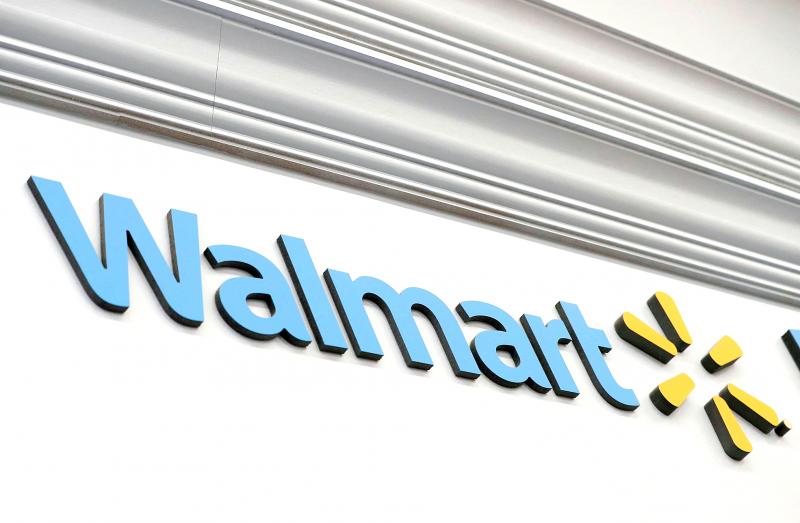Walmart Inc is preparing to create its own cryptocurrency and collection of non-fungible tokens (NFTs), filings with the US Patent and Trademark Office show, setting the stage for meeting its customers in the emerging metaverse.
The retailer last month sought several new trademarks that show it intends to make and sell virtual goods such as electronics, decor, toys, sporting goods and personal care products.
The applications, which were first reported by CNBC, represent a significant step for the retail giant as it studies how to participate in the metaverse, a virtual world that blends aspects of digital technologies.

Photo: Reuters
Walmart in August last year advertised a position to develop the “digital currency strategy and product roadmap,” while identifying “crypto-related investment and partnerships,” a job posting on the company’s Web site said.
The applications were among a flurry that the company filed on Dec. 30, including three under “Walmart Connect” — the name of the company’s existing digital advertising venture — for a financial exchange for virtual currency and advertising.
Applications also were filed for “Verse to Store,” “Verse to Curb” and “Verse to Home” for shopping services.
It is also seeking trademarks to apply the Walmart name and “fireworks” logo to healthcare services and education in virtual and augmented reality.
“Walmart is continuously exploring how emerging technologies may shape future shopping experiences,” the company responded in an e-mailed statement. “We don’t have anything further to share today, but it’s worth noting we routinely file trademark applications as part of the innovation process.”
All of the applications were filed indicating that the company intends to use them, but has not yet begun doing so.
The trademarks would not be registered until they are in actual use.
The company’s cryptocurrency plans were the subject of a high-profile hoax in September last year, when a fake announcement caused a short-lived surge in litecoin, a relatively obscure cryptocurrency.
The fabricated news release said that Walmart would start letting its customers pay with litecoin.
In October, the Arkansas-based retailer started a pilot program in which shoppers can buy bitcoin at Coinstar kiosks in some of its stores.
The test with Coinstar, which is known for the machines that let customers exchange US coins for paper bills or gift cards, includes 200 kiosks in Walmart stores.
Early last month, Walmart chief financial officer Brett Biggs told an analyst conference that the company was open to allowing shoppers to pay in cryptocurrency if customers demand it, but the company did not see a need to rush out any capabilities.

In Italy’s storied gold-making hubs, jewelers are reworking their designs to trim gold content as they race to blunt the effect of record prices and appeal to shoppers watching their budgets. Gold prices hit a record high on Thursday, surging near US$5,600 an ounce, more than double a year ago as geopolitical concerns and jitters over trade pushed investors toward the safe-haven asset. The rally is putting undue pressure on small artisans as they face mounting demands from customers, including international brands, to produce cheaper items, from signature pieces to wedding rings, according to interviews with four independent jewelers in Italy’s main

Japanese Prime Minister Sanae Takaichi has talked up the benefits of a weaker yen in a campaign speech, adopting a tone at odds with her finance ministry, which has refused to rule out any options to counter excessive foreign exchange volatility. Takaichi later softened her stance, saying she did not have a preference for the yen’s direction. “People say the weak yen is bad right now, but for export industries, it’s a major opportunity,” Takaichi said on Saturday at a rally for Liberal Democratic Party candidate Daishiro Yamagiwa in Kanagawa Prefecture ahead of a snap election on Sunday. “Whether it’s selling food or

CONCERNS: Tech companies investing in AI businesses that purchase their products have raised questions among investors that they are artificially propping up demand Nvidia Corp chief executive officer Jensen Huang (黃仁勳) on Saturday said that the company would be participating in OpenAI’s latest funding round, describing it as potentially “the largest investment we’ve ever made.” “We will invest a great deal of money,” Huang told reporters while visiting Taipei. “I believe in OpenAI. The work that they do is incredible. They’re one of the most consequential companies of our time.” Huang did not say exactly how much Nvidia might contribute, but described the investment as “huge.” “Let Sam announce how much he’s going to raise — it’s for him to decide,” Huang said, referring to OpenAI

The global server market is expected to grow 12.8 percent annually this year, with artificial intelligence (AI) servers projected to account for 16.5 percent, driven by continued investment in AI infrastructure by major cloud service providers (CSPs), market researcher TrendForce Corp (集邦科技) said yesterday. Global AI server shipments this year are expected to increase 28 percent year-on-year to more than 2.7 million units, driven by sustained demand from CSPs and government sovereign cloud projects, TrendForce analyst Frank Kung (龔明德) told the Taipei Times. Demand for GPU-based AI servers, including Nvidia Corp’s GB and Vera Rubin rack systems, is expected to remain high,